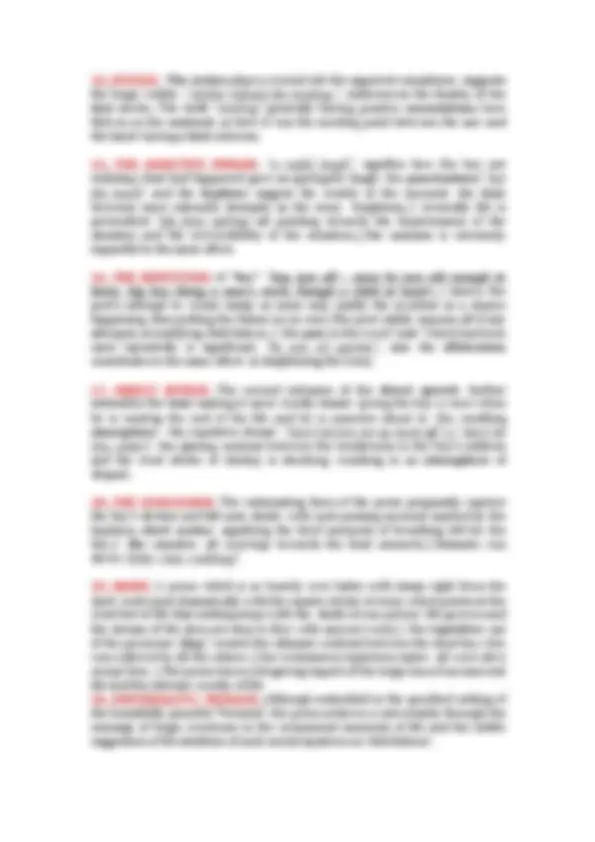



Study with the several resources on Docsity

Earn points by helping other students or get them with a premium plan


Prepare for your exams
Study with the several resources on Docsity

Earn points to download
Earn points by helping other students or get them with a premium plan
Community
Ask the community for help and clear up your study doubts
Discover the best universities in your country according to Docsity users
Free resources
Download our free guides on studying techniques, anxiety management strategies, and thesis advice from Docsity tutors
Robert frost's poem 'out out' explores the themes of life's fragility, the helplessness of the innocent, and the irony of child labor through the story of a young boy's tragic accident at a lumber mill. The poem's structure, use of consonance and alliteration, and narrative tone create a powerful and poignant reflection on the human condition.
Typology: Exercises
1 / 3

This page cannot be seen from the preview
Don't miss anything!


1.TITLE- refers to Macbeth’s speech in Shakespeare’s play- ‘Macbeth’ wherein he comments on the frailty of life and the despair in life with focus on lady Macbeth’s death. “Out, out, brief candle! life’s but a walking shadow, a poor player that struts and frets his hour upon the stage and then is heard no more.” In the poem- the focus too is on the helplessness of the poor, young boy, who becomes an innocent victim of a deplorable accident. There is the added effect of the contrast as while Lady Macbeth was not innocent- the boy in the poem was! - his only fault being- distraction, which cost him his life.
2. SETTING- a young boy employed as child labour at a lumber- mill/ in Vermont- he goes unnamed- which adds to the tragic element- as he is shown to become an unknown, insignificant victim of a tragedy- yet such a tragedy in the life of a common person as opposed to that of Macbeth or Lady Macbeth, is suggested to be no less tragic. 3. STRUCTURE- blank verse- no division into stanzas/ absence of rhyme- abundance of run-on-lines- enjambment- “however it was, neither refused the meeting.” suggesting the overlapping of life situations, without clear boundaries at times, just as a normal day in the life of the boy overlapped to be the last day of his life- it also spells the unpredictability in life. The poem is written in iambic pentameter, which helps to lay stress upon the tragic element in the poem. 4. CONSONANCE AND THE ONOMATOPOEIA- “buzz”, “snarled”, “rattled”- strike a discordant/ unpleasant - jarring note right at the outset- capturing the harsh sound of the heartless ‘saw’-jargon - “buzz saw”- the consonant ‘d’ creates a heavy sound synonymous with death. 5. THE CONSONANT effect continues into the second line/ alliteration- “dust and dropped”- along with the visual imagery- “stove- length sticks of wood” capture the essence and the proceedings at the scene of action. 6. ALLITERATION- “sweet- scented stuff”-/ olfactory image- creates a rather pleasant setting in contrast with the opening line- against a calm and beautiful image of the setting sun in Vermont. The striking visual imagery- “five mountain ranges one behind the other under the sunset far into Vermont.” - add the aesthetic sense- thus contributing to the forthcoming contrast- The tone is narrative, the mood gradually turns sombre, serious- ultimately verging on the utter hopelessness of the situation. 7. THE CAESURA creates the essential pause, foreshadowing the fatal blow and the fatal halt// soon followed suit by another example in the next line - “and nothing happened: day was all but done.” The immediate contradiction has an ironic impact as although nothing had happened until then- the moment was just close when everything would fatally stop// the alliteration lays emphasis
on the day- which was quite done in terms of the day’s work- but this simple fact withholds a deeper tragic irony - soon to be laid bare.
8. THE TONE is casual, thus in a way underplaying the forthcoming tragedy- it is much like the calm before the storm// The tone undergoes a lot of variation from the starting point where the serenity of the initial setting creates a rather contemplative tone, and likewise a similar mood; this however, changes as the situation becomes more tense until a sense of shock completely transforms the prevailing tone and mood, and thus the resulting atmosphere is overshadowed by a sense of sudden doom and death. 9. THE FIRST PERSON VOICE: is of the passer-by or a random onlooker the spoken voice for the poet - “to please the boy by giving him the half hour/that a boy counts so much when saved from work.” are marked by complete innocence, harmlessness- thus in retrospect these moments in the poem prepare us for the paradox in the moment which seemed all good but turned the wheels in the opposite direction forever- in fact stopping the very fountain of life for the under- aged labourer- who also stands as the symbol of the exploitation and child labour. 10. REPETITON: The word the “boy” has been repeated several times-he goes unnamed- suggesting the commonness and the insignificance of instances which may be as greatly tragic as the loss of a king- it may not have the same dimension in terms of the impact but on the other hand such instances mark the loss of an innocent life- which makes it as tragic. The boy would have remained a labourer all his life-what is of the essence is the flimsy line between life and death- pointing out the irony of life and the suddenness and finality of death.//this also crashes the idea of social hierarchy by conveying the message that the loss of a human life is what is significant no matter what the social stature. 11. VISUAL IMAGERY: the visual image of the sister- “his sister stood beside them in her apron”- once again strikes a stroke of irony wherein the trivial is being given importance in contrast with what was much bigger in importance-// the caesura intensifies the impact.// The religious overtones and the symbolic impact of “supper” brings to mind ‘the last supper’- and the idea of the final betrayal- here the betrayal at the cruel hands of life- 12. STRUCTURE: the significance of the structure - it being blank verse (narrative in tone)-is highlighted in the absence of the stanzas , the absence of rhyme and the enjambment which suggests the overlap between life and death- there being only a hairline margin between the two. The pentameter effect creates the required impact by laying emphasis on the even numbered syllables- “the buzz saw snarled” 13. PERSONIFICATION: The personification of the saw captures the drastic nature of the incident in which the poet once again highlights the irony by suggesting that perhaps the fault was of the boy- “he must have given the hand.”- the use of the imperative creates the irony.